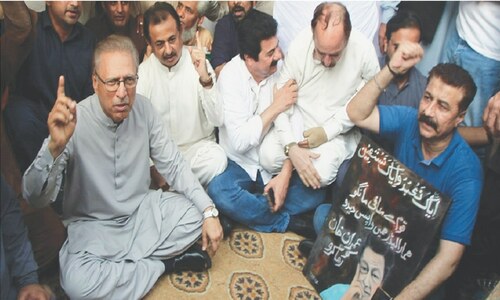
DAVOS: Prime Minister Yousuf Raza Gilani said on Saturday there was no chance of a military coup because the army favoured democracy and stability in the country.
In an interaction with the media here on the sidelines of the annual meeting of the World Economic Forum, he said: “I don’t think there will be a coup in Pakistan ever. There is no threat to democracy.”
The prime minister said no state institution, military or people wanted a coup and all were in favour of democracy.
He said Pakistan today is a functioning democracy with a fully empowered parliament. “We have a vibrant civil society, free media and an independent judiciary.”
Mr Gilani said the international media was taking a keen interest in the change in Islamabad’s ties with Washington after the killing of 24 Pakistani soldiers in a Nato attack on two military posts on Nov 26.
The incident was a “turning point” and caused bad blood between the two governments, Mr Gilani said.
The prime minister said the Defence Committee of the Cabinet decided to redefine terms of engagement with the United States and, as an initial move, cut off supplies for Nato-led forces in Afghanistan, got the Shamsi airbase vacated and boycotted the Bonn conference on Afghanistan.
“In the light of recent events, we are reviewing our relations to build a long-term relationship on the basis of mutual respect, trust and interest.”
In reply to a question, Mr Gilani said former president Musharraf took decisions without taking the nation into confidence. “If there is no support of the public no one can win a war.”
He said Pakistan was against “illegal and counter-productive” drone strikes and had conveyed its concerns to the United States.
Mr Gilani said Pakistan was paying a heavy price for peace, progress and prosperity of the world.
When asked about the presence of the late Al Qaeda leader Osama bin Laden in Pakistan, he said it was a global failure of intelligence agencies.
Asked by an Indian journalist about the likely fallout of another Mumbai-style attack, he said: “Ifs and when do not make a story.”
He recalled his visit to Mohali last year to see the World Cup semi-final at the invitation of Prime Minister Manmohan Singh, observing: “We have resumed comprehensive dialogue with India. We are in the process of normalising trade relations, which will benefit both countries.”
Pakistan wanted good relations with all its neighbours and if India had any information, it should share it with Pakistan, the prime minister stressed.
He termed Dr Singh a “genuine person” and said he (Mr Singh) too was desirous of resolving all issues with Pakistan, including Kashmir.
The prime minister said Pakistan attached importance to its relations with Afghanistan as a peaceful and stable neighbour was in “our strategic interest”. “We see Pakistan as a factor of peace, stability and development in the region.”
He said Pakistan was cooperating with its partners in Saarc and ECO for promoting economic collaboration.
Mr Gilani pointed to the challenges the country faced. “We have to eradicate terrorism, we have to create more jobs for our youth, we have to invest in energy and physical infrastructure, and we have to pay more attention to health and education.
We are facing all these challenges upfront and squarely.”
The prime minister said his government had been pursuing a policy of reconciliation with other political forces. He said reconciliation was a legacy of Benazir Bhutto.
“Our policy of reconciliation has resulted in adoption of the landmark 18th Amendment by consensus in both houses of parliament.”
He said under the 18th Amendment, the President had voluntarily surrendered his powers to parliament and the federation had agreed to transfer resources and responsibilities to the provinces.
He said it could rightly be described as a quiet revolution towards building a strong and prosperous Pakistan.
Pakistan had immense potential and was endowed with riches, the most important of which was its young population, Mr Gilani said.
He said Pakistan was at the confluence of South, Central and West Asia, serving as a natural land bridge between the energy-rich and the fastest growing economies of the world.—APP











































